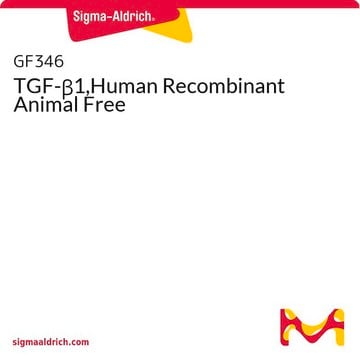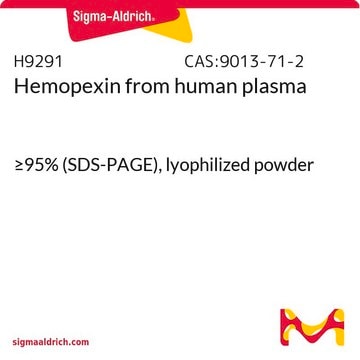T5050
Transforming Growth Factor-β1 from porcine platelets
≥97% (SDS-PAGE), recombinant, powder, suitable for cell culture
Synonyme(s) :
TGF-β1
About This Item
Produits recommandés
product name
Transforming Growth Factor-β1 from porcine platelets, TGF-β1, powder, suitable for cell culture
Source biologique
Porcine (Platelets)
Niveau de qualité
Pureté
≥97% (SDS-PAGE)
Forme
powder
Puissance
0.01-0.1 ng/mL ED50/EC50
Qualité
endotoxin tested
Poids mol.
protein 25 kDa
Conditionnement
pkg of 1 μg
pkg of 10 μg
Conditions de stockage
avoid repeated freeze/thaw cycles
Technique(s)
cell culture | mammalian: suitable
Impuretés
≤1 EU/μg
Numéro d'accès UniProt
Température de stockage
−20°C
Informations sur le gène
pig ... TGFB1(397078)
Description générale
Application
Actions biochimiques/physiologiques
Forme physique
Remarque sur l'analyse
Code de la classe de stockage
11 - Combustible Solids
Classe de danger pour l'eau (WGK)
WGK 3
Point d'éclair (°F)
Not applicable
Point d'éclair (°C)
Not applicable
Équipement de protection individuelle
Eyeshields, Gloves, type N95 (US)
Certificats d'analyse (COA)
Recherchez un Certificats d'analyse (COA) en saisissant le numéro de lot du produit. Les numéros de lot figurent sur l'étiquette du produit après les mots "Lot" ou "Batch".
Déjà en possession de ce produit ?
Retrouvez la documentation relative aux produits que vous avez récemment achetés dans la Bibliothèque de documents.
Les clients ont également consulté
adipose tissue- and bone marrow-derived mesenchymal stem
cells?a comparative study
Notre équipe de scientifiques dispose d'une expérience dans tous les secteurs de la recherche, notamment en sciences de la vie, science des matériaux, synthèse chimique, chromatographie, analyse et dans de nombreux autres domaines..
Contacter notre Service technique




